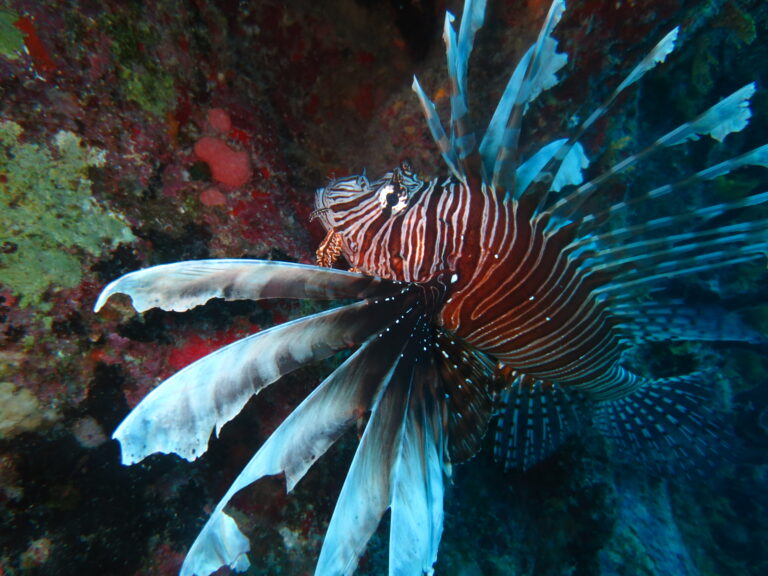New research by Blue Ventures Conservation has revealed important insights into the diets of invasive lionfish in the Belize Barrier Reef. The researchers found that large lionfish in Bacalar Chico Marine Reserve consume greater quantities of prey than smaller individuals, and that they dine on a wider variety of species. In contrast, small lionfish appear to have a more restricted diet, which may have a greater impact on populations of their favourite prey.
The invasion of the Indo Pacific red lionfish (Pterois volitans) in the Western Atlantic is one of the Caribbean’s principal conservation concerns. Since it was introduced to the waters of the Florida Keys in the 1980s, its population has exploded.
Successful invasions of marine fishes are rare, so this unusual event has been well documented across the region. Alarmingly high growth and reproductive rates have been reported in many areas, and the presence of even small numbers of lionfish has been found to disrupt native coral reef ecosystems. With wide mouths and a fast strike, lionfish gobble down almost any fish that swims within range.
This is a particular concern for areas of the Belize Barrier Reef that are home to threatened or endemic species, such as the social wrasse (Halichoeres socialis). This critically endangered fish lives only in the shallow coral reefs and mangroves of Pelican Cayes, southern Belize, but lionfish in that area have been found to specifically target it, pushing the species ever closer to extinction.
Although the eradication of lionfish is now deemed impossible due to the broad geographic extent of the invasion, population suppression has been found to help protect coral reef fish communities. In Belize, different lionfish removal models are being explored, including a market-driven fishery approach and culling by dive tour operators and Blue Ventures expedition volunteers. However, both these methods use spears or hooks and tend to target larger individuals, which are considered better to eat and reach higher prices. This new research further supports the theory that in order to successfully protect threatened or endemic species at specific sites, both large and small lionfish should be targeted.
Blue Ventures, in partnership with the government, fishers and scientists, is leading the development of Belize’s National Lionfish Management Strategy that will help to ensure that control efforts across the country protect and improve livelihoods of all Belizeans, and the health of Belize’s marine environment.
Download the full paper: Management implications of the influence of biological variability of invasive lionfish diet in Belize
Read more from Blue Ventures on Pterois volitans: A market-based approach to manage the invasion of Pterois volitans in Belize


















